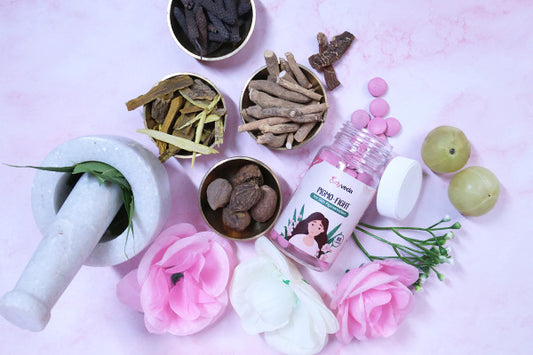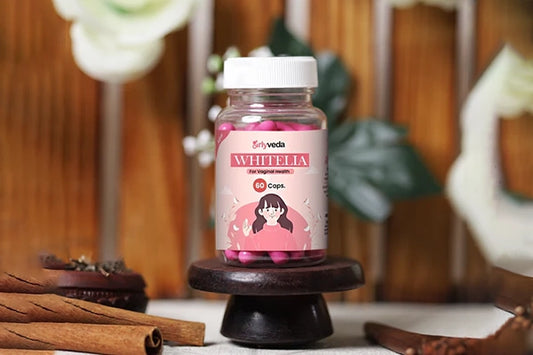Dietary Strategies to Manage Heavy Menstrual Bleeding

Heavy menstrual bleeding is a common problem faced by millions of women all over the world. The medical term for this condition is menorrhagia. This condition can be very painful and worrisome as it comes with many difficulties, such as anemia, menstrual pain, and period discomfort. It generally occurs when the blood does not have enough healthy blood cells. In this blog, we will discuss heavy menstrual bleeding, its causes, and some dietary strategies.
What Causes Heavy Menstrual Bleeding?
Menorrhagia, or heavy menstrual bleeding, can be a sign of many underlying conditions. Following are some of those conditions that can be a possible cause for heavy blood flow during menses.
- Hormonal Imbalance: When there is a hormonal imbalance in your body, the endometrium becomes too thick, causing heavy bleeding or unexpected bleeding during your periods.
- Uterine Fibroids: Uterine fibroids are a type of tumor that generally develops during the child-bearing years and can be a reason for heavy menstrual bleeding or a long menstrual cycle.
- Polyps: These are the small, growing tissues on the endometrium lining that cause heavy menstrual bleeding. It can also cause spotting or bleeding after menopause.
- Anovulation: It is the condition in which no eggs are being released from the ovaries, which causes an imbalance in the hormone level, causing heavy blood flow during periods.
- Adenomyosis: It is a medical condition in which the tissues lining the uterus grow into a muscular wall, which leads to heavy bleeding and extreme pain.
- Stress And Menstruation: Stress can be a big factor in hormonal imbalance in women, which is a possible cause of heavy periods.
There can be many other reasons, including these. To be sure about what causes you to bleed heavily during your menses; you need to consult an expert.
SymptomsBelow mentioned are some common causes of heavy menstrual bleeding.
- Periods that last more than a week.
- Soaking through more than one sanitary pad in an hour.
- To control menstrual bleeding, you need double sanitary protection.
- Passing larger blood clots.
- As a result of blood loss, feeling extremely tired, fatigue, or loss of breadth.
- Get up at night for a pad change.
Dietary Strategies To Maintain Menorrhagia
Dietary changes cannot fully replace medications and treat heavy blood flow and period discomfort; however, here are some dietary changes that can help in managing heavy menstrual bleeding by reducing the symptoms.
- Iron-Rich Food: heavy blood flow during menstruation can lead to iron deficiency and anemia, eating iron-rich foods such as dark green leafy vegetables, lentils, fish, eggs, and fortified cereals can help replenish this.
- Vitamin B12 And Folic Acid: During menorrhagia, red blood cells are generally less than normal. Incorporating foods rich in vitamin B12 and folic acid, such as eggs, meat, dairy products, fortified plant-based products, green leafy vegetables, beans, and lentils, can help in the production of red blood cells and prevent heavy menstrual bleeding.
- Omega 3 Fatty Acids: omega 3 fatty acids have anti-inflammatory properties that can reduce inflammation and may help regulate menstrual flow. Fatty fish, flex seed, chia seed, and walnuts are some examples of foods rich in omega-3 fatty acids.
- Magnesium: Magnesium can help relax muscles and reduce bloating and menstrual pain during periods. Avocado, nuts, seeds, and whole grains are some examples of magnesium-rich dietary supplements.
- Vitamin K: Vitamin K is responsible for blood clotting. Eating foods rich in vitamin K can help control heavy menstrual bleeding. Kale, spinach, broccoli, cabbage, soybeans, eggs, and cheese are great sources of vitamin K.
- Anti-Inflammatory Foods: foods such as vegetables, whole grains, and nuts contain anti-inflammatory properties and help to reduce menorrhagia.
- Hydration: dehydration is one of the drawbacks of heavy periods of bleeding, which can affect your bodily functions. Drinking plenty of water keeps you hydrated and helps regulate body functions.
- Limit Caffeine And Alcohol Consumption: consumption of alcohol or caffeine can be harmful and worsen menstrual symptoms like bloating and menstrual pain. Limiting these can help in managing heavy periods.
- A Balanced Diet For Heavy Periods: eating balanced meals including protein, healthy fat, and complex carbohydrates can help maintain blood sugar levels and energy and also help manage heavy periods.
Conclusion
Heavy menstrual bleeding is a common condition affecting millions of women around the world, also known as menorrhagia. It generally occurs when the blood does not produce enough healthy red blood cells. Heavy periods can be a potential symptom of many underlying conditions, such as hormonal imbalance, uterine fibrosis, anovulation, polyps, adenomyosis, and stress. Heavy periods can be very painful and worrisome, but adding nutrients like iron, magnesium, vitamin B12, folic acid, omega-3 fatty acids, and vitamin K can help reduce period heavy blood flow. It should be kept in mind to consult an expert before taking any unknown medicines and to know the real cause behind the heavy menstrual flow.












Thoughts on "Dietary Strategies to Manage Heavy Menstrual Bleeding"